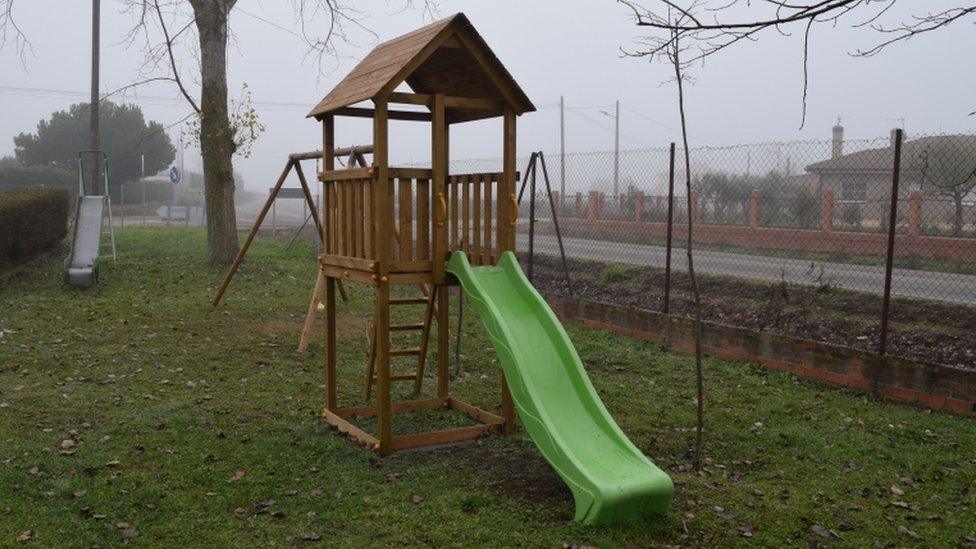Spain election: Podemos and Citizens push politics into unknown
- Published
Two new political parties in Spain hope to do well in Sunday's general election. Tom Burridge analyses their rise to frontline politics
The power monopoly of Spain's political heavyweights is set to take a hit as two new contenders fight for power in national elections on 20 December.
Podemos on the left and Ciudadanos (Citizens), who sell themselves as a party of the centre, are riding high in the opinion polls and could change the face of Spanish politics.
Citizens leader Albert Rivera launched his party in 2006 posing naked on campaign posters while Podemos (We Can) only emerged last year, led by charismatic university professor Pablo Iglesias.
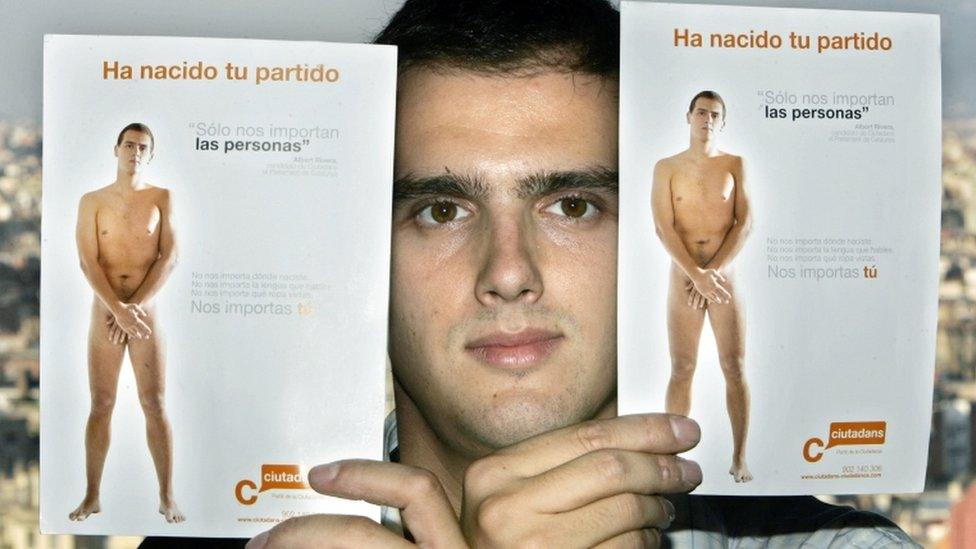
Albert Rivera posed nude to emphasise the idea of a new party being born in 2006
Until now, investment consultant Olga Garcia Tascon and pet food shop owner Elisa Reyna would both have been perfect targets for the ruling Popular Party (PP).
But Prime Minister Mariano Rajoy can no longer count on their votes because they are both looking at Citizens, which only launched on the national stage last year and claims to occupy the political centre-ground.
Elisa Reyna has always voted for the PP before.
She owns a a pet food and pet accessories wholesaler and runs an online business selling both.
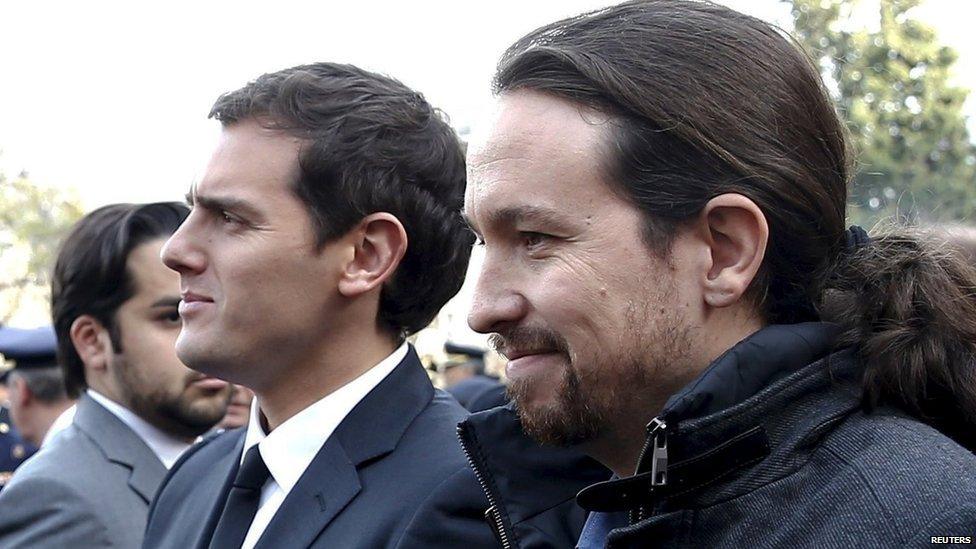
Citizens leader Albert Rivera (L) and Podemos party leader Pablo Iglesias attended a state funeral in Madrid together on Tuesday
Her business employs 18 people on the edge of Madrid. They survived the economic crisis and are now benefiting from improved consumer confidence.
"You see that people are gaining enough confidence to buy a puppy, which is a big expense for the family," she says.
The PP has made much during this election campaign of its management of Spain's economy, which will probably grow this year by more than 3%.
But Elisa was unhappy with the government's tax increases and believes more could have been done to tackle regional bureaucracy and the high jobless rate. Unemployment soared to 26% in 2013 and has now fallen to 22%.
Corruption fight
Olga, 50, has not voted in a Spanish election since 1982. But she is now a convert to Citizens, a party that was born in Catalonia and has championed the anti-independence cause there.
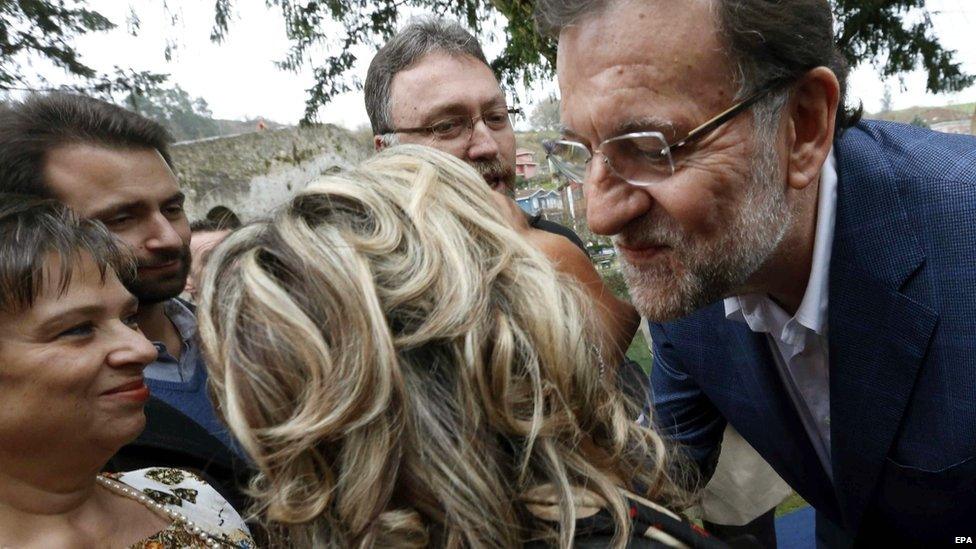
Mr Rajoy visited voters in Asturias on Wednesday
Until now she felt like a "political orphan" because she could not identify with either the PP or the Socialists (PSOE), who have dominated Spanish politics for 33 years.
Citizens' most important election promise is to make Spain's judiciary more independent, she believes.
"All the judges in Spain are political posts and that is why corruption cases are not dealt with properly," she says.
Politics has become a dirty word in Spain in recent years due to a string of corruption scandals, the most high-profile of which have touched Mr Rajoy's PP.
And yet virtually all opinion polls put the PP in the lead, even though no single party is likely to receive enough support to form a government on its own.
A study of their own recent polls by polling company Sigma Dos gave the PP an average of 28%, well below its score four years ago of 45%, and well short of enough votes to give it a majority in the parliament.
'Desperate people'
Podemos is the other party facing its first general election.
It is hoping to build on success at municipal elections in May when its allies took control of Madrid, Barcelona, Zaragoza and Cadiz.
The party, which was born from the anti-austerity protest movement during Spain's economic crisis, now pitches itself as an alternative to the more unequal society that it says has now emerged.
Marta currently earns €485 (£352; $533) a month caring for an elderly man five hours a day, five days a week.
She has been in and out of part-time, low-paid jobs since 2009 and only has work guaranteed until the end of this month.
"Of course the unemployment rate has gone down because there are desperate people who don't even register themselves as being unemployed any more," she told us.
Marta has seen the cost of living go up and her ability to earn go down, and she believes Podemos is the party that is capable of bringing "real change" to Spain.

The men who would govern Spain
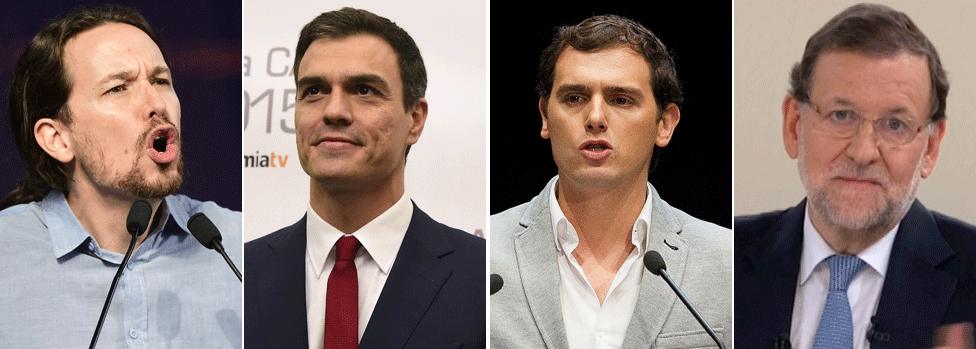
From L to R: Pablo Iglesias of Podemos, Socialist leader Pedro Sanchez, Albert Rivera of Citizens and PP leader Mariano Rajoy
Pablo Iglesias, 37, university lecturer, leader of new anti-capitalist party Podemos. Sound-bite: "The problem isn't Greece, the problem is Europe. Germany and the IMF are destroying the political project of Europe"
Pedro Sanchez, 43, academic, leader of established Socialist party (PSOE). Sound-bite: "The head of the government, Mr Rajoy, has to be a decent person, and you are not"
Albert Rivera, 36, lawyer and former competitive swimmer, leader of new Citizens (Ciudadanos) party. Sound-bite: "They [Podemos] blame the system - we blame the people who have corrupted the system"
Mariano Rajoy, 60, prime minister and leader of established, conservative Popular Party. Sound-bite: "Who today is talking about bailout Spain? No-one"

Too close to call
The two leaders of Spain's new parties are both in their thirties.
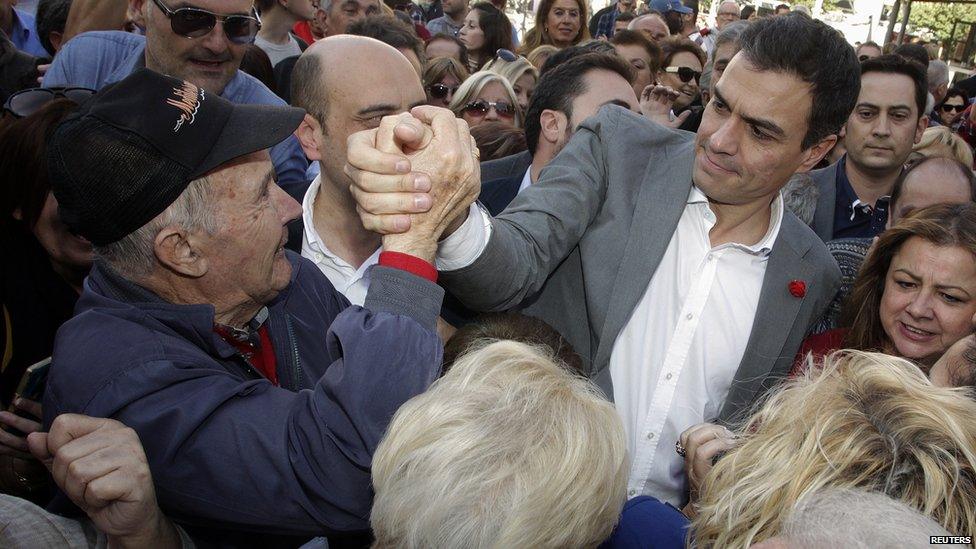
PSOE leader Pedro Sanchez is a new face on an old party
Albert Rivera sells Citizens as "sensible change", a dig at Podemos, whose opponents paint it as a more radical option on the left.
Pablo Iglesias and his allies accuse Citizens of being a younger and more modern version of the right-wing PP.
When you add into the mix the ambitions of the relatively new Socialist leader Pedro Sanchez, you realise why calling this election is a fool's game.
When the results are in, forming a government will be even harder.
Citizens says it will not go into a coalition government as a junior partner.
The Socialists have ruled out a pact with the PP, as have Podemos.
Guessing the colours (note plural) of Spain's next government is no longer a question of "someone on the left", or "someone on the right".

Spain at a crossroads
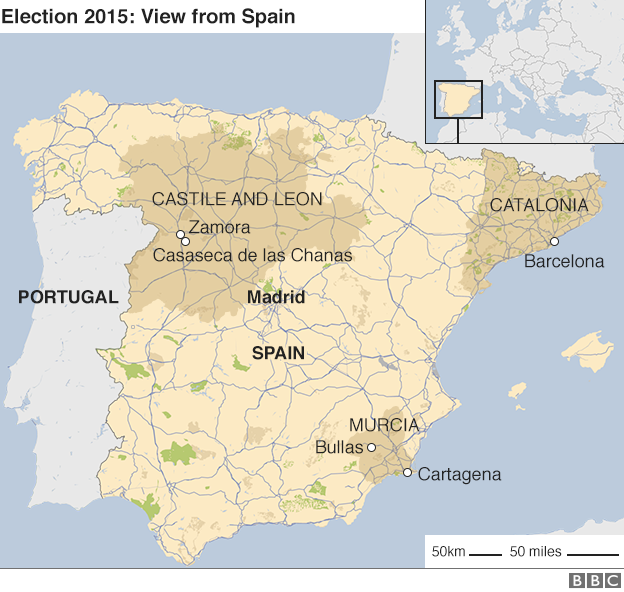
Housing row in Catalonia: Taking back Barcelona's apartments
Depopulation in rural Castile and Leon: Resisting change in a dying village
Early school-leavers in Murcia: Spain's voters call for shake-up in classroom
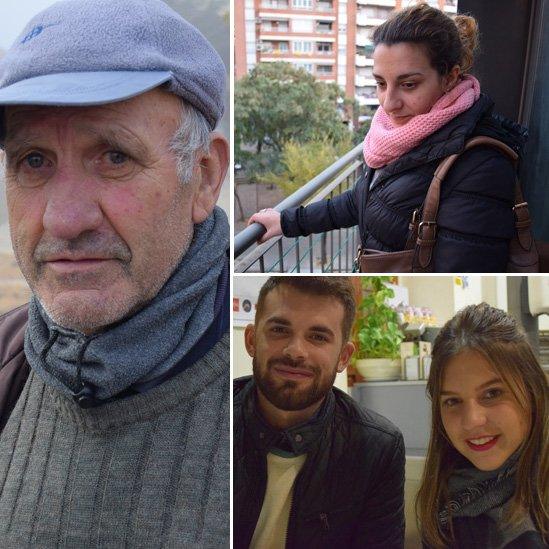

- Published4 December 2015
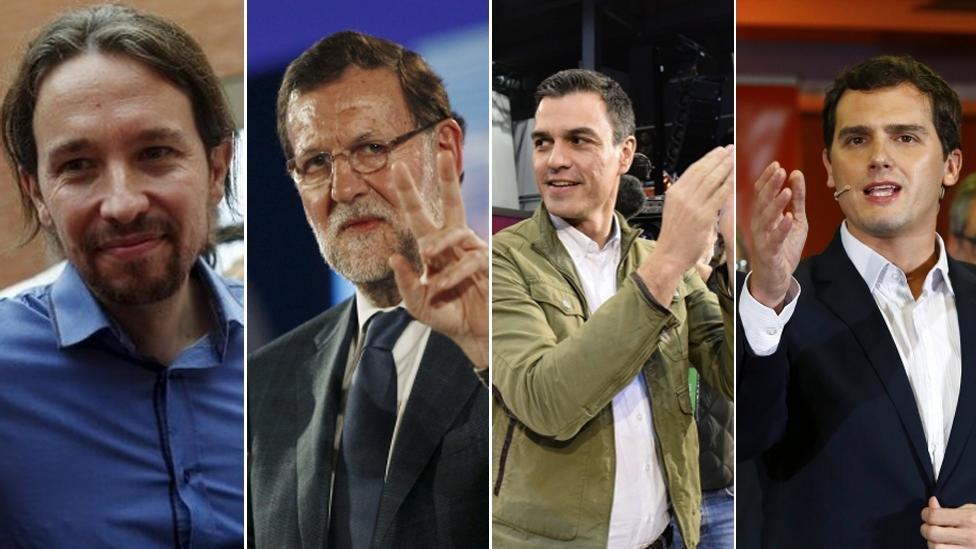
- Published12 December 2015
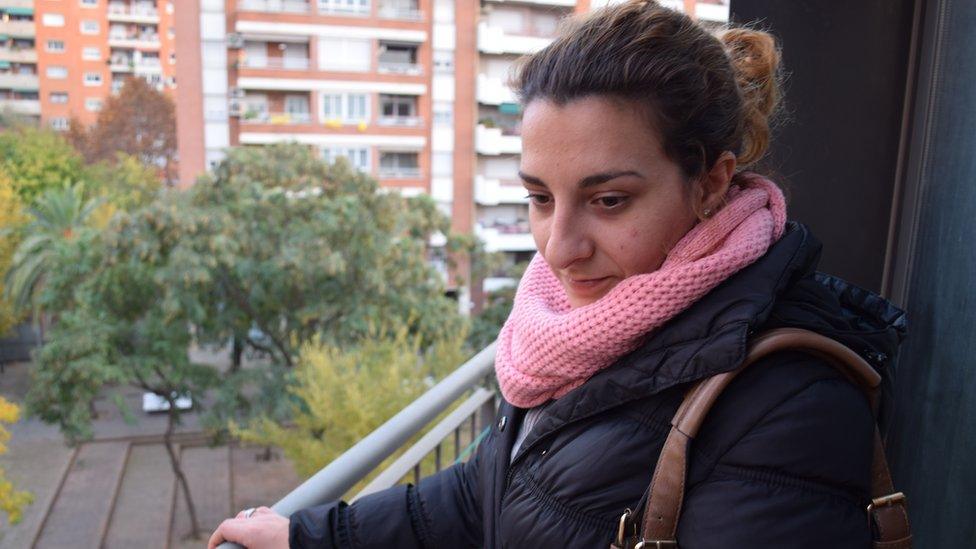
- Published8 December 2015
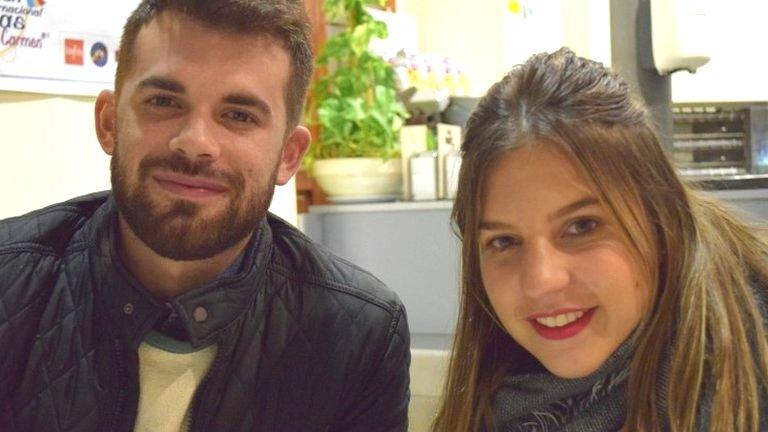
- Published10 December 2015
